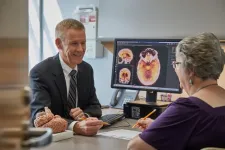Published in The Lancet Neurology, this international study sequenced the genomes of 100 infants with unexplained seizures, along with their parents, from four countries (England, USA, Canada and Australia) to better understand the potential strengths of early, broad genome sequencing (a process which looks for changes across the entire genome) for infantile epilepsy.
The researchers used rapid genome sequencing (rGS) to investigate the impact of an expedited genetic diagnosis on care for the first time. Across all children enrolled in the study, 43 per cent received a diagnosis within weeks, and that diagnosis impacted prognosis in nearly 90 per cent of those cases, guiding treatment options for over half.
Called Gene-STEPS (Shortening Time to Epilepsy Services), the study is the first collaboration launched through the International Precision Child Health Partnership (IPCHiP), an international consortium (Boston Children’s Hospital, Murdoch Children’s Research Institute with The Royal Children’s Hospital in Melbourne Australia, The Hospital for Sick Children (SickKids) and UCL Great Ormond Street Institute of Child Health and Great Ormond Street Hospital) that leverages each institution’s expertise and genomic infrastructure to accelerate discovery and the development of therapies for children.
Genetic insights inform course of care for infantile epilepsy Currently, there are more than 800 different genetic causes of infantile epilepsy and many have similar symptoms during infancy. Unlike more targeted genetic testing that is often used to confirm a suspected diagnosis, rapid genome sequencing looks for any changes in a person’s DNA that may explain a medical condition, analyzing the entire genome.
In this study, both biological parents and the infant underwent rGS, known as ‘trio’ sequencing, to more quickly understand whether gene changes in the children were inherited or new to the child (de novo). These insights are important for families to understand how the results may impact their lives and any future family planning.
For the participants for whom initial analysis did not provide a genetic explanation for their seizures, the research team noted that a “negative” result from this genetic test was also an important piece of information for families and clinicians, providing an informed path forward for the child’s care.
The international research team is continuing to follow-up with clinicians and study participants to understand how rGS has influenced the child’s development, but the work doesn’t stop there. A greater understanding of the genetic variants involved in epilepsy may help identify eligibility for clinical trials and inform the development of tailored interventions.
This study was funded by the American Academy of Pediatrics, Boston Children’s Hospital Children’s Rare Disease Cohorts Initiative, Canadian Institutes of Health Research, Epilepsy Canada, Feiga Bresver Academic Foundation, Great Ormond Street Hospital Charity, Medical Research Council, Murdoch Children’s Research Institute, National Institute of Child Health and Human Development, NIHR Great Ormond Street Hospital Biomedical Research Centre, One8 Foundation, Ontario Brain Institute, Robinson Family Initiative for Transformational Research, The Royal Children's Hospital Foundation, and University of Toronto McLaughlin Centre.
###
Notes to Editors
Quotes by country:
UK
Dr. Amy McTague, study co-lead, honorary consultant paediatric neurologist at Great Ormond Street Hospital and clinician scientist at the UCL Great Ormond Street Institute of Child Health, said: “It’s incredibly exciting to share the results from the first phase of this IPCHiP project and, importantly, it is fantastic that this research has provided powerful evidence for the clinical benefits of rapid genomic sequencing in infants with new-onset epilepsy. Through global collaboration of expert researchers, we have shown how this testing can be used, across four different healthcare systems, to rapidly diagnose children with epilepsy, finding an answer for over 40% and guiding treatment in over 50% of these children. This has the potential to impact many families across the world and provide much needed information to clinical teams in charge of their care. We are incredibly grateful to every family that took part in this study, research like this is only possible because of them.”
USA
Dr. Annapurna Poduri, study co-lead and Director of the Neurogenetics and Epilepsy Genetics Programs at Boston Children’s Hospital, said: "The status quo has been to treat seizures like a symptom and try to find medications that alleviate them. But medications aren’t getting at the underlying causes of epilepsy. We all feel a deep sense of responsibility to bring our genetic discovery successes to our patients. By bringing together experts from across the world in epilepsy and genomics, we demonstrated that if providing an underlying diagnosis to families and providers – quickly – was made a priority, we could better inform future treatment, evaluation, prognosis, and counseling for families of kids with infantile epilepsy. We hope our collaborative example serves as a blueprint for other pediatric disorders so more children and families will have an opportunity to reach a precise diagnosis."
Australia
Dr. Katherine Howell, Paediatric neurologist and clinician-scientist and study co-lead at Murdoch Children's Research Institute, said: “Uncontrolled seizures in the developing brain can lead to high rates of developmental setbacks. Identifying the cause early can help guide treatment options, such as changes to medications, which can improve seizure control. However, current genetic testing methods often take months and result in missed opportunities. We expect this cutting-edge sequencing technology to improve the health outcomes of babies with epilepsy by providing care at the earliest possible stage. More than half who received a diagnosis in our study saw their treatment plan change as result, a remarkable outcome for this vulnerable population.”
Canada
Dr. Vann Chau, Staff Neurologist and Project Investigator in the Neurosciences & Mental Health Program at The Hospital for Sick Children (SickKids), said: “The power of Gene-STEPS lies in its ability to create more informed clinical care. By integrating genome sequencing into the care pathway, clinicians can identify any variations in the genome, inherited or otherwise, that help adjust how they care for their patient. In Canada, genome sequencing is only available for select individuals as part of research studies, but by keeping genome sequencing in the research realm we are missing out on potentially life-altering information for every other child with epilepsy. Regardless of whether there is an underlying genetic cause, the information gathered from genome sequencing can help clinicians develop a care plan that is specific to the medical needs of each patient.”
Dr. Greg Costain, Staff Physician in the Division of Clinical and Metabolic Genetics, and Scientist-Track Investigator in the Genetics & Genome Biology Program at The Hospital for Sick Children (SickKids), said: “Thanks to our international, multi-centre partnership, we were able to clearly showcase that early rapid genome sequencing can inform the course of care for children with infantile epilepsy. SickKids has been championing a new approach to paediatric medicine – Precision Child Health – which includes using genomics to better classify disease so it can be treated earlier and more effectively. Our hope is that these findings will help us advocate for greater access to genome sequencing in clinical care and lay the groundwork for precision medicine interventions that could one day offer individualized treatment options for every patient and family.”
For more information, or to speak to the researchers involved, please contact:
(UK) Fiona Calvert, Genomics Comms Lead, Great Ormond Street Hospital., T: +44 7854 898 349, E: fiona.calvert@gosh.nhs.uk
(USA) Gina Mantica, Boston Children's Hospital Senior Media Relations Specialist, T: +1-617-919-3110, E: gina.mantica@childrens.harvard.edu
(Australia) Bridie Byrne, Murdoch Children’s Media Manager, T: +61 457 365 848, E: bridie.byrne@mcri.edu.au
(Canada) Taryn Welch, The Hospital for Sick Children (SickKids), Senior Communications Advisor, E: taryn.welch@sickkids.ca
END









